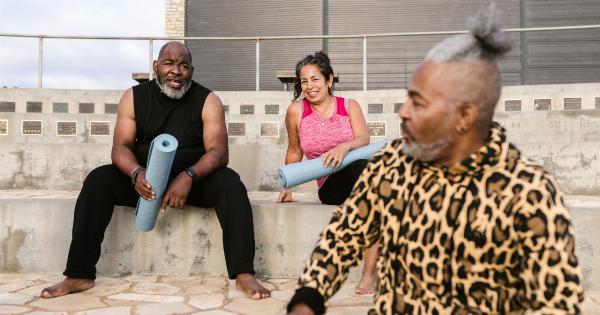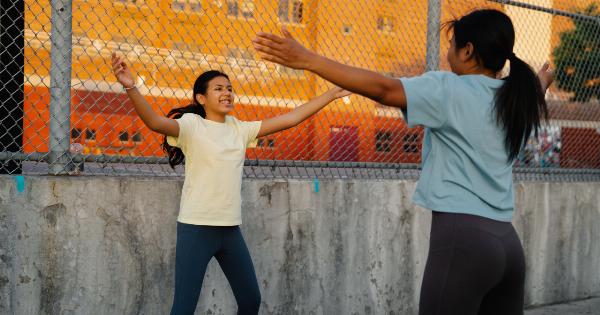Exercise is important for people of all ages, and it offers numerous benefits for physical and mental well-being. Unfortunately, many individuals let age become a barrier to staying active and engaging in regular exercise.
However, aging should not be an excuse to stop exercising. In fact, regular physical activity becomes even more vital as we get older. This article explores the reasons why age should never be a limiting factor when it comes to exercise.
1. Exercise Promotes Longevity
One of the greatest benefits of exercising regularly is its ability to promote longevity.
Numerous studies have shown that individuals who maintain an active lifestyle tend to live longer and have a higher quality of life compared to those who lead sedentary lives. Exercise helps to reduce the risk of chronic illnesses, such as heart disease, diabetes, and certain types of cancer, which can greatly increase life expectancy.
2. Maintains Muscle Mass and Strength
Aging naturally leads to a decline in muscle mass and strength. This loss of muscle mass, known as sarcopenia, can result in reduced mobility, increased risk of falls, and lowered overall functionality.
Regular exercise, particularly strength and resistance training, can help slow down or even reverse this process. Engaging in activities that challenge the muscles, such as weightlifting or yoga, can help preserve muscle mass and maintain strength as you age.
3. Increases Bone Density
As we age, our bones become more fragile and prone to fractures, leading to conditions such as osteoporosis. Exercise, specifically weight-bearing exercises like walking, jogging, or dancing, can improve bone density and reduce the risk of fractures.
By putting stress on the bones, these activities stimulate bone-building cells to create stronger and denser bones.
4. Improves Joint Health
Contrary to popular belief, exercise does not harm the joints; in fact, it can actually improve joint health. Regular physical activity helps lubricate the joints, reduces stiffness and pain, and increases flexibility.
Low-impact exercises such as swimming and cycling are especially beneficial for individuals with joint conditions like arthritis, as they provide gentle movement and help maintain joint function.
5. Boosts Cognitive Function
Exercise is not just beneficial for the body; it also has a positive impact on cognitive function. Regular physical activity improves blood flow to the brain, which enhances memory, attention, and overall cognitive performance.
Additionally, exercise has been linked to a reduced risk of age-related cognitive decline and neurodegenerative diseases such as Alzheimer’s and dementia.
6. Enhances Mood and Mental Well-being
Exercise is a natural mood lifter and can significantly improve mental well-being. Physical activity stimulates the release of endorphins, also known as the “feel-good” hormones, which can help alleviate symptoms of depression and anxiety.
Regular exercise can also promote better sleep, reduce stress levels, and increase self-confidence, leading to an overall improved quality of life.
7. Maintains Heart Health
Cardiovascular diseases, such as heart attacks and strokes, become increasingly common as we age. Engaging in regular aerobic exercises like brisk walking, cycling, or swimming helps maintain heart health.
These activities strengthen the heart muscle, improve circulation, reduce blood pressure, and lower cholesterol levels, effectively reducing the risk of cardiovascular diseases.
8. Manages Weight and Metabolism
Maintaining a healthy weight becomes more challenging as we age, but regular exercise can help manage weight and boost metabolism.
Physical activity helps burn calories, build lean muscle mass, and increase metabolism, all of which contribute to weight management. Additionally, staying active helps prevent age-related weight gain and obesity, which are associated with a higher risk of various health problems.
9. Improves Balance and Coordination
Loss of balance and coordination is a common symptom of aging and can increase the risk of falls and injuries.
However, incorporating exercises that improve balance, such as yoga or tai chi, can help maintain stability and reduce the likelihood of falls. These activities enhance proprioception and strengthen the muscles responsible for balance, leading to better coordination and reducing the risk of accidents.
10. Provides Social Interaction
Exercise offers an excellent opportunity for social interaction and can help combat feelings of isolation and loneliness, which are often more prevalent in older adults.
Joining group fitness classes, walking with friends, or participating in recreational sports can provide a sense of community and support network. Social engagement has been linked to improved mental health and overall well-being.
Conclusion
Age should never be a reason to stop exercising. The numerous benefits of exercise at any age far outweigh any potential limitations that may come with aging.
Regular physical activity promotes longevity, maintains muscle mass and strength, increases bone density, improves joint health, boosts cognitive function, enhances mood and mental well-being, maintains heart health, manages weight and metabolism, improves balance and coordination, and provides social interaction. It is crucial to adopt an exercise routine that suits your abilities and interests to stay active, healthy, and happy throughout your life.



























